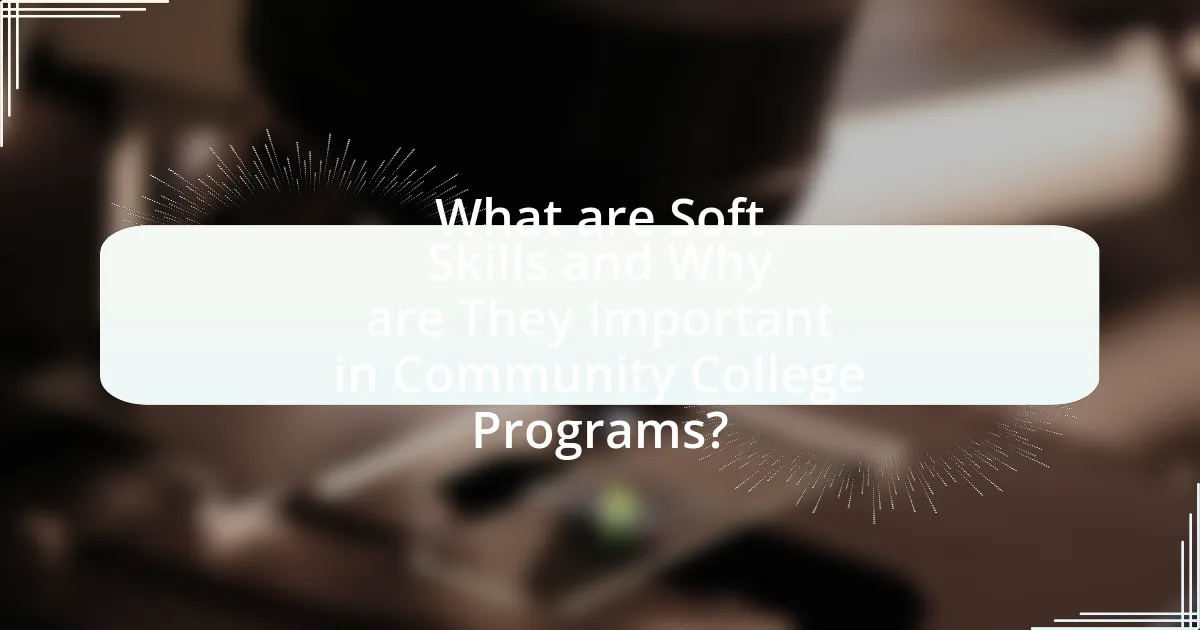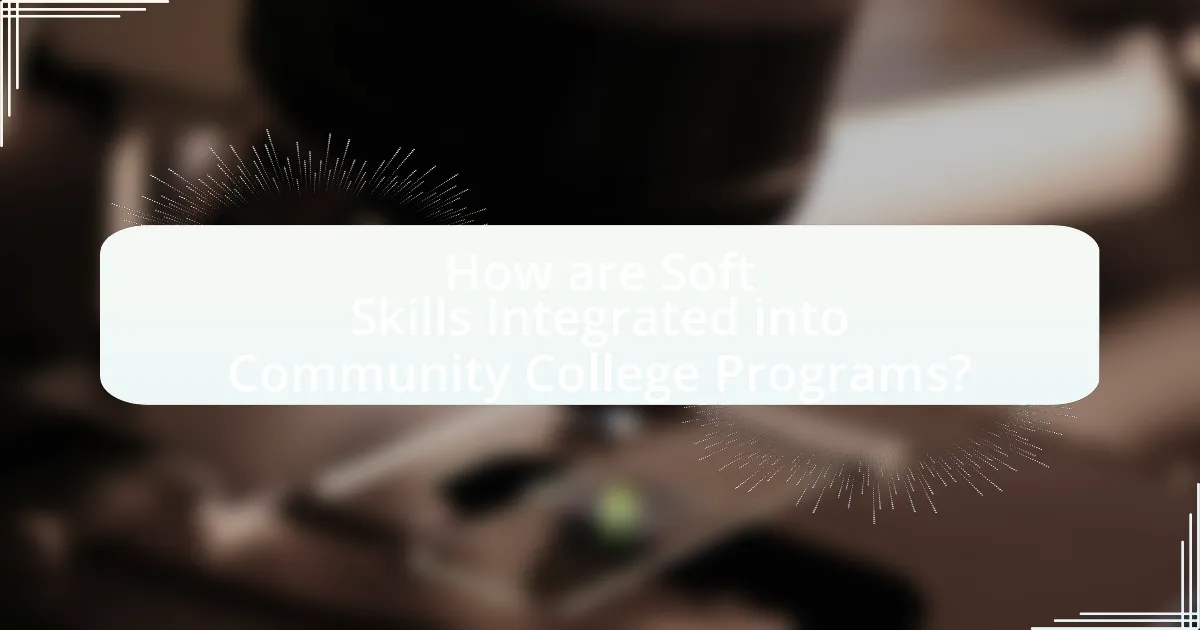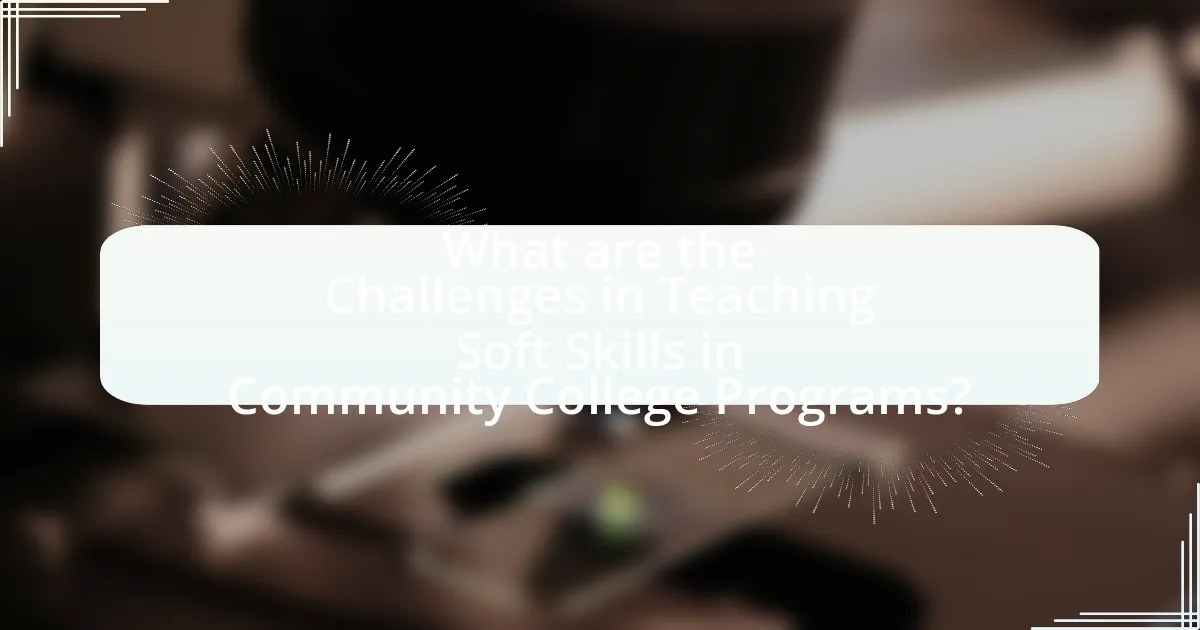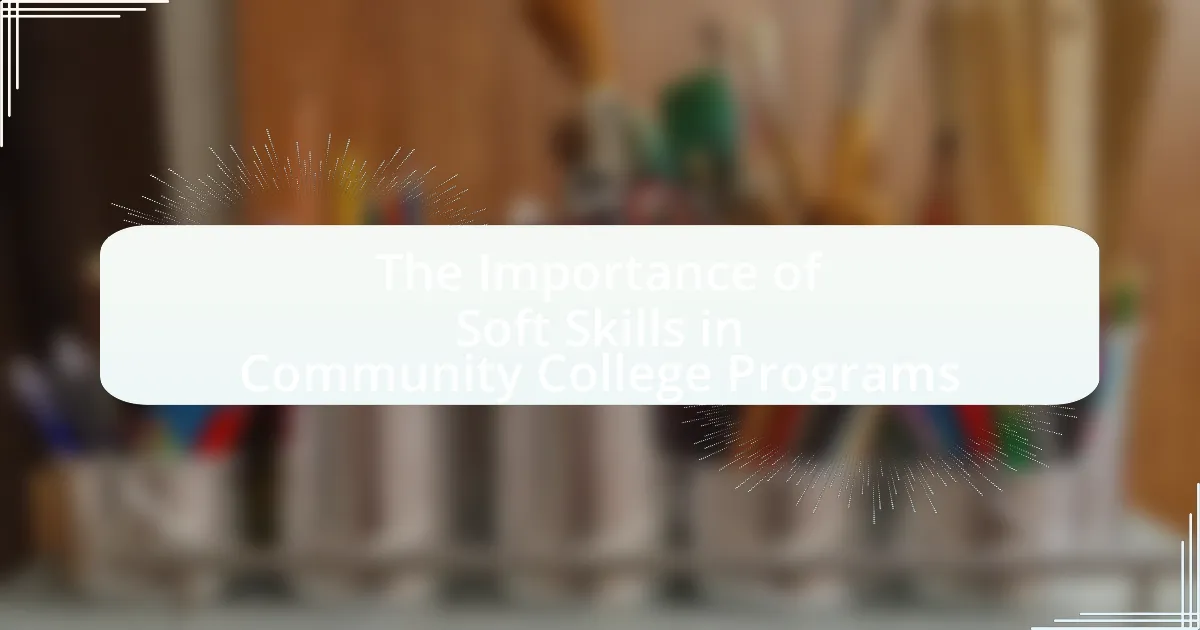The article focuses on the significance of soft skills in community college programs, emphasizing their role in enhancing students’ employability and career readiness. It distinguishes soft skills, such as communication, teamwork, and problem-solving, from hard skills, highlighting the increasing demand for these interpersonal attributes among employers. The article explores how community colleges integrate soft skills training into their curricula through experiential learning, group projects, and workshops, while also addressing the challenges faced in teaching these skills. Additionally, it outlines best practices for both educators and students to effectively develop and enhance soft skills, ultimately preparing students for success in the workforce.

What are Soft Skills and Why are They Important in Community College Programs?
Soft skills are interpersonal attributes that enable individuals to communicate effectively, collaborate, and solve problems in various environments. In community college programs, these skills are crucial because they enhance students’ employability and prepare them for the workforce, where technical skills alone are often insufficient. Research from the National Association of Colleges and Employers indicates that 93% of employers prioritize soft skills in hiring decisions, highlighting their significance in career readiness. Additionally, community colleges often focus on developing these skills through group projects, presentations, and networking opportunities, which are integral to fostering a well-rounded educational experience.
How do soft skills differ from hard skills?
Soft skills differ from hard skills in that soft skills are interpersonal attributes that enable effective communication and collaboration, while hard skills are specific, teachable abilities or knowledge sets related to a particular task or job. For example, soft skills include teamwork, problem-solving, and emotional intelligence, which facilitate workplace interactions, whereas hard skills encompass technical proficiencies like coding, data analysis, or operating machinery. Research indicates that employers increasingly prioritize soft skills; a LinkedIn survey found that 92% of talent professionals believe that soft skills are equally or more important than hard skills in hiring decisions.
What specific soft skills are essential for students in community college?
Effective communication, teamwork, problem-solving, adaptability, and time management are essential soft skills for students in community college. These skills enable students to collaborate effectively with peers, articulate ideas clearly, and navigate challenges in academic and professional settings. Research indicates that employers prioritize these soft skills, with a survey by the National Association of Colleges and Employers showing that 73% of employers seek candidates with strong communication abilities. Additionally, the ability to work well in teams is crucial, as 88% of employers value teamwork skills. Thus, mastering these soft skills significantly enhances students’ employability and success in community college programs.
Why is the development of soft skills crucial for career readiness?
The development of soft skills is crucial for career readiness because these skills enhance employability and workplace effectiveness. Employers increasingly prioritize soft skills such as communication, teamwork, and problem-solving, as evidenced by a survey from the National Association of Colleges and Employers, which found that 73% of employers seek candidates with strong interpersonal skills. Additionally, research from the World Economic Forum highlights that by 2025, skills like emotional intelligence and critical thinking will be among the top skills needed in the workforce. Thus, cultivating soft skills in community college programs prepares students to meet these demands and succeed in their careers.
What role do soft skills play in student success?
Soft skills play a crucial role in student success by enhancing interpersonal communication, teamwork, and problem-solving abilities. These skills enable students to effectively collaborate with peers, engage with instructors, and navigate academic challenges. Research indicates that students with strong soft skills are more likely to achieve higher grades and complete their programs. For instance, a study published in the Journal of Education and Training Studies found that 70% of employers prioritize soft skills over technical skills when hiring, highlighting the importance of these competencies in both academic and professional settings.
How do soft skills impact academic performance?
Soft skills significantly enhance academic performance by improving communication, collaboration, and problem-solving abilities among students. Research indicates that students with strong soft skills tend to engage more effectively in group projects, leading to better learning outcomes. For instance, a study published in the Journal of Educational Psychology found that students who demonstrated high levels of teamwork and communication skills achieved higher grades compared to their peers with weaker soft skills. This correlation underscores the critical role that soft skills play in fostering a productive academic environment and facilitating successful learning experiences.
In what ways do soft skills enhance interpersonal relationships among students?
Soft skills enhance interpersonal relationships among students by fostering effective communication, collaboration, and empathy. Effective communication allows students to express their thoughts clearly and understand others, which reduces misunderstandings and builds trust. Collaboration skills enable students to work together on projects, promoting teamwork and a sense of belonging. Empathy helps students appreciate diverse perspectives, leading to stronger connections and support networks. Research indicates that students with strong soft skills are more likely to engage positively with peers, resulting in improved academic performance and social interactions. For instance, a study by the National Association of Colleges and Employers found that 93% of employers prioritize soft skills in hiring, highlighting their significance in fostering positive relationships.

How are Soft Skills Integrated into Community College Programs?
Soft skills are integrated into community college programs through a combination of curriculum design, experiential learning opportunities, and dedicated workshops. Community colleges often embed soft skills training within academic courses, ensuring that students develop communication, teamwork, and problem-solving abilities alongside technical knowledge. For instance, programs may include group projects that require collaboration and effective communication, thereby reinforcing these essential skills in a practical context. Additionally, many community colleges offer workshops and seminars focused specifically on soft skills, such as conflict resolution and leadership, which further enhance students’ interpersonal capabilities. Research indicates that employers increasingly prioritize soft skills, with a survey by the National Association of Colleges and Employers revealing that 93% of employers seek candidates with strong communication skills, underscoring the importance of integrating these competencies into educational programs.
What teaching methods are effective for developing soft skills?
Experiential learning methods, such as role-playing, group projects, and simulations, are effective for developing soft skills. These methods engage students in real-world scenarios, allowing them to practice communication, teamwork, and problem-solving skills in a controlled environment. Research by the Association of American Colleges and Universities indicates that experiential learning significantly enhances students’ ability to apply soft skills in professional settings, demonstrating a direct correlation between these teaching methods and improved soft skill proficiency.
How can experiential learning opportunities foster soft skills?
Experiential learning opportunities foster soft skills by providing hands-on experiences that enhance interpersonal communication, teamwork, and problem-solving abilities. Engaging in real-world scenarios, such as internships or group projects, allows students to practice and refine these skills in a practical context. Research indicates that students who participate in experiential learning report improved collaboration and adaptability, essential components of soft skills. For instance, a study by the National Association of Colleges and Employers found that 73% of employers prioritize candidates with strong soft skills, highlighting the direct correlation between experiential learning and employability.
What role do group projects play in soft skills development?
Group projects play a crucial role in soft skills development by fostering collaboration, communication, and problem-solving abilities among participants. Engaging in group projects requires individuals to work together towards a common goal, which enhances their ability to communicate effectively, negotiate roles, and resolve conflicts. Research indicates that students involved in collaborative learning environments demonstrate improved interpersonal skills, as they learn to listen actively and provide constructive feedback. For instance, a study published in the Journal of Educational Psychology found that students who participated in group projects reported higher levels of teamwork and leadership skills compared to those who worked individually. This evidence underscores the significance of group projects in cultivating essential soft skills that are vital for success in both academic and professional settings.
How do faculty and staff contribute to soft skills training?
Faculty and staff contribute to soft skills training by integrating these skills into the curriculum and providing mentorship. Faculty members design courses that emphasize communication, teamwork, and problem-solving, ensuring that students practice these skills through group projects and presentations. Staff members support this training by offering workshops and resources focused on interpersonal skills, conflict resolution, and professional etiquette. Research indicates that students who engage in structured soft skills training alongside academic learning demonstrate improved employability and workplace readiness, highlighting the essential role of faculty and staff in this developmental process.
What strategies can instructors use to promote soft skills in the classroom?
Instructors can promote soft skills in the classroom by integrating collaborative projects, role-playing activities, and reflective practices into their curriculum. Collaborative projects encourage teamwork and communication, allowing students to practice interpersonal skills while working towards a common goal. Role-playing activities simulate real-world scenarios, enabling students to develop problem-solving and conflict-resolution skills in a controlled environment. Reflective practices, such as journaling or group discussions, foster self-awareness and critical thinking, essential components of emotional intelligence. Research indicates that these strategies enhance student engagement and improve soft skill development, which is crucial for success in the workforce.
How can community college staff support students in developing soft skills?
Community college staff can support students in developing soft skills by integrating experiential learning opportunities into the curriculum. This approach allows students to engage in real-world scenarios, enhancing their communication, teamwork, and problem-solving abilities. Research indicates that experiential learning significantly improves soft skill development; for instance, a study published in the Journal of Education and Training found that students who participated in collaborative projects reported a 30% increase in their interpersonal skills. Additionally, staff can facilitate workshops focused on specific soft skills, such as conflict resolution and time management, providing structured environments for practice and feedback. By offering mentorship programs, staff can also guide students in applying these skills in professional settings, further reinforcing their importance in career readiness.

What are the Challenges in Teaching Soft Skills in Community College Programs?
Teaching soft skills in community college programs faces several challenges, including limited instructional time, varying student backgrounds, and the difficulty of assessment. Limited instructional time restricts the ability to integrate soft skills training into already packed curricula, often leading to these skills being overlooked. Additionally, students come from diverse backgrounds with different levels of prior exposure to soft skills, making it challenging for instructors to tailor their teaching methods effectively. The difficulty of assessing soft skills, which are often subjective and context-dependent, further complicates the teaching process, as traditional evaluation methods may not accurately reflect a student’s proficiency in these areas.
What obstacles do educators face in integrating soft skills into the curriculum?
Educators face several obstacles in integrating soft skills into the curriculum, primarily due to a lack of standardized assessment methods and insufficient training. The absence of clear metrics for evaluating soft skills makes it challenging for educators to measure student progress effectively. Additionally, many educators report feeling unprepared to teach soft skills, as traditional teacher training programs often focus more on academic content than on interpersonal skills. Research from the National Association of Colleges and Employers indicates that employers prioritize soft skills, yet educational institutions struggle to align their curricula with these workforce demands, creating a disconnect between education and employment needs.
How can limited resources affect soft skills training?
Limited resources can significantly hinder soft skills training by restricting access to essential materials, qualified instructors, and practical learning opportunities. For instance, community colleges with budget constraints may lack the funding to provide workshops, seminars, or interactive sessions that are crucial for developing skills such as communication, teamwork, and problem-solving. Research indicates that effective soft skills training often requires experiential learning environments, which are difficult to create without adequate resources. A study by the National Center for Education Statistics shows that institutions with limited financial support often report lower student engagement in soft skills development programs, ultimately affecting students’ employability and readiness for the workforce.
What misconceptions do students have about the importance of soft skills?
Students often misconceive soft skills as less important than technical skills in their education and career development. This belief stems from a focus on measurable academic achievements and specific job-related competencies, leading students to undervalue skills such as communication, teamwork, and adaptability. Research indicates that employers prioritize soft skills, with a survey by the National Association of Colleges and Employers revealing that 93% of employers seek candidates with strong interpersonal skills. This highlights the critical role soft skills play in employability and workplace success, contradicting the misconception that they are secondary to technical abilities.
How can community colleges overcome these challenges?
Community colleges can overcome challenges related to the importance of soft skills by integrating soft skills training into their curricula and fostering partnerships with local businesses. By embedding soft skills development, such as communication, teamwork, and problem-solving, into academic programs, community colleges can enhance students’ employability. Research from the National Association of Colleges and Employers indicates that 93% of employers prioritize soft skills in hiring decisions, highlighting the necessity for educational institutions to adapt. Additionally, collaboration with local businesses can provide real-world experiences and feedback, ensuring that the training aligns with industry needs. This approach not only addresses the skills gap but also prepares students for successful careers.
What best practices can be implemented to enhance soft skills training?
To enhance soft skills training, implementing experiential learning techniques is essential. Experiential learning, such as role-playing, simulations, and group projects, allows students to practice and refine their interpersonal skills in real-world scenarios. Research indicates that active participation in learning activities significantly improves retention and application of soft skills, as evidenced by a study published in the Journal of Education and Training Studies, which found that students engaged in experiential learning demonstrated a 30% increase in soft skills competency compared to traditional lecture-based methods. Additionally, incorporating feedback mechanisms, such as peer evaluations and instructor assessments, further supports skill development by providing students with constructive insights on their performance.
How can partnerships with local businesses aid in soft skills development?
Partnerships with local businesses can significantly aid in soft skills development by providing real-world experiences that enhance communication, teamwork, and problem-solving abilities. These collaborations often involve internships, workshops, and mentorship programs where students engage directly with professionals, allowing them to practice and refine their soft skills in practical settings. For instance, a study by the National Association of Colleges and Employers found that 73% of employers prioritize candidates with strong interpersonal skills, highlighting the importance of experiential learning opportunities facilitated by local businesses. Such partnerships create a bridge between academic knowledge and workplace expectations, ensuring that students are better prepared for future employment.
What are the best practices for students to develop their soft skills?
Students can develop their soft skills by actively engaging in collaborative projects, participating in workshops, and seeking feedback from peers and instructors. Collaborative projects enhance teamwork and communication abilities, as students must work together to achieve common goals. Workshops focused on specific soft skills, such as leadership or conflict resolution, provide structured learning environments where students can practice and refine these skills. Additionally, seeking constructive feedback allows students to identify areas for improvement and adapt their interpersonal approaches. Research indicates that students who engage in these practices demonstrate significant growth in their soft skills, which are essential for success in both academic and professional settings.
How can students actively seek opportunities to improve their soft skills?
Students can actively seek opportunities to improve their soft skills by engaging in extracurricular activities, internships, and group projects. Participating in clubs or organizations allows students to collaborate with peers, enhancing teamwork and communication abilities. Internships provide real-world experiences where students can practice problem-solving and adaptability in professional settings. Additionally, group projects in academic courses foster negotiation and conflict resolution skills, essential components of effective interpersonal communication. Research indicates that students who engage in such activities report higher levels of confidence and competence in their soft skills, which are critical for career success.
What resources are available for students to enhance their soft skills?
Students can enhance their soft skills through various resources such as workshops, online courses, mentorship programs, and extracurricular activities. Workshops often focus on communication, teamwork, and problem-solving, providing hands-on experience. Online platforms like Coursera and LinkedIn Learning offer courses specifically designed to develop soft skills, with many institutions providing free access to students. Mentorship programs connect students with experienced professionals who can guide them in developing interpersonal skills. Additionally, participating in clubs and organizations fosters teamwork and leadership abilities, reinforcing the importance of soft skills in real-world scenarios.

Leave a Reply